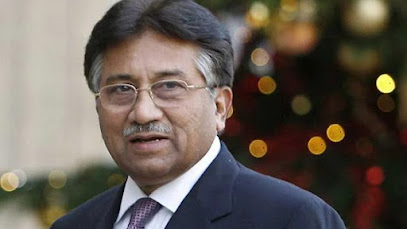MAJOR DECISIONS BY ELECTED LEADERS
In Pakistan,
General Pervez Musharraf led a military coup in October 1999. He overthrew a democratically
elected government and declared himself the ‘Chief Executive’ of the country.
Later he changed his designation to President and in 2002 held a referendum in
the country that granted him a five-year extension. Pakistani media, human
rights organisations and democracy activists said that the referendum was based
on malpractices and fraud. In August 2002 he issued a ‘Legal Framework Order’
that amended the Constitution of Pakistan. According to this Order, the
President can dismiss the national and provincial assemblies. The work of the
civilian cabinet is supervised by a National Security Council which is
dominated by military officers. After passing this law, elections were held to
the national and provincial assemblies. So Pakistan has had elections, elected
representatives have some powers. But the final power rested with military
officers and General Musharraf himself.
General Pervez Musharraf
Clearly,
there are many reasons why Pakistan under General Musharraf should not be called
a democracy. But let us focus on one of these. Can we say that the rulers are
elected by the people in Pakistan? Not quite. People may have elected their
representatives to the national and provincial assemblies but those elected
representatives were not really the rulers. They cannot take the final
decisions. The power to take final decision rested with army officials and with
General Musharraf, and none of them were elected by the people. This happens in
many dictatorships and monarchies. They formally have an elected parliament and
government but the real power is with those who are not elected. In the
previous chapter we read about the role of the USSR in communist Poland and that of the USSR in communist Poland and that of the
US in contemporary Iraq. Here the real power was with some external powers and
not with locally elected representatives. This cannot be called people’s rule.
This gives
us the first feature. In a democracy the final decision-making power must rest
with those elected by the people.
FREE AMD FAIR ELECTORAL COMPETITION
In China, elections are regularly held after
every five years for electing the country’s parliament, called Quanguo Renmin
Daibiao Dahui (National
People’s Congress). The National People’s Congress has
the power to appoint the president of the Country. It has nearly 3,000
members elected from all over China. Some members are elected by the army.
Before contesting elections, a candidate needs the approval of the Chinese
Communist Party. Only those who are members of the Chinese Communist Pary or
eight smaller parties allied to it were allowed to contest elections held in
2002-03. The government is always formed by the Communist Party.
Since its
independence in 1930, Mexico hlods elections after every six years to elect its
President. The country has never been under a military or dictator’s rule. But
until 2000 every election was won by a judiciary whose orders are obeyed by
everyone. We shall read more about these rights in Chapter Six.
Similarly
there are some conditions that apply to the way a government is run after the
elections. a democratic government cannot do whatever it likes, simply because
it has won an election. It has to respect some basic rules. In particular it
has to respect some guarantees to the minorities. Every major decision has to
go through a series of consultations. Every office bearer has certain rights
and responsibilities assigned by the constitution and the law. Each of these is
accountable not only the people but also to other independent officials. We
shall read more about this in Chapter Five.
Both these
aspects give us the fourth and final feature of democracy: a democratic
government rules within limits set by constitutional law and citizens’ rights.
SUMMARY DEFINITION
Let us sum
up the discussion so far. we started with a simple definition that democray is
a form of government in which the rulers are elected by the people. We found
that this definition was not adequate unless we explained some of the key
worlds used in it. Through a series of examples we worked out four features of
democracy as a form of government. Accordingly, democracy is a form of
government In which:
Rulers
elected by the people take all the major decisions;
Elections
offer a choice and fair opportunity to the people to change the current rulers;
This choice
and opportunity is available to all the people on an equal basis; and
The exercise
of this choice leads to a government limited by basic rules of the constitution
and citizens’ rights.


